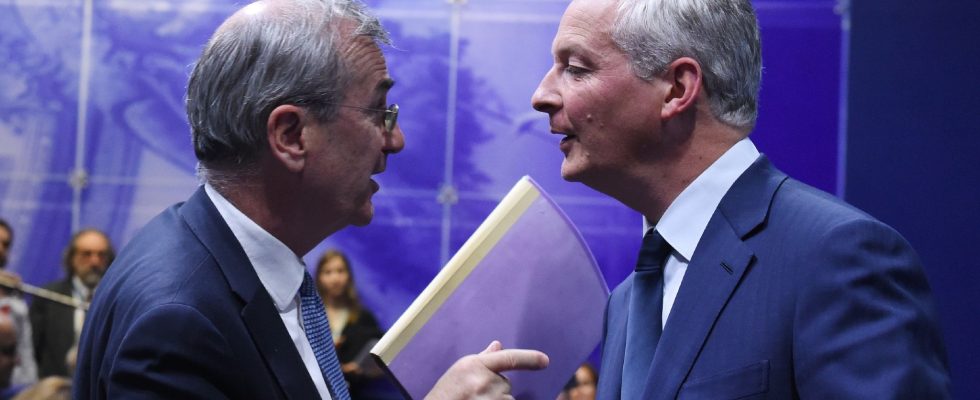He is one of the only ministers to have reason to rejoice in these times of political crisis. While the government is playing its survival this Monday afternoon, threatened by two motions of censure, Bruno Le Maire, he can afford to be optimistic in the face of the forecasts of the Banque de France. Guest this morning from BFM TVthe Minister of the Economy welcomed the French situation.
Shaken by the resumption of economic activity after three confinements and a global health crisis, then the outbreak of the war in Ukraine which redefined many trade routes, the French economy nevertheless sees its horizon emerge in the coming months. , according to the quarterly forecasts of the Banque de France, the benchmark institution in this area.
In its latest projections, published on Monday March 20, the institution, for example, doubles its growth forecasts in France for 2023 and now expects a 0.6% increase in gross domestic product (GDP), against 0.3% envisaged. until then. This is close to the figure put forward by the government, of the order of 1%. How ? The Banque de France explains that it expects higher growth in global demand and less pronounced inflation in the coming months, based on the current trend.
This relaunch should be supported in particular by household consumption (+1.5% in 2024 and +1.6% in 2025), the remuneration of which should experience more dynamic growth than in recent years. The average salary per head, which includes overtime and bonuses, should grow by 6% in 2023, 4.6% in 2024 and 3.7% in 2025, without purchasing power jumping in the same proportions. “This increase in wages should not lead to an inflationary spiral”, specifies the Banque de France.
- Slightly lower inflation
More good news: on the inflation front, the central bank is lowering its forecast for 2023. While food inflation has taken over from energy inflation as the main driver of price increases, it should peak “towards the end of the first half”, according to Matthieu Lemoine, one of the authors of the 2023-2025 macroeconomic projections published on Monday.
All goods and services included, the harmonized consumer price index (HICP) – the inflation barometer which refers to the European level and which the Banque de France uses in its projections – would increase by 5.4% on average annual in 2023, against 6% expected so far.
HICP inflation should then decline to 2.4% in 2024 then 1.9% in 2025, falling below the 2% mark targeted by the European Central Bank (ECB), thanks to “the planned easing of agricultural inputs […] and the international prices of agricultural raw materials”, explains the institution.
However, there should not be a “red month” even if “there is obviously a point of attention and there is a period of high food prices which is very sensitive for our fellow citizens”, declared François Villeroy of Galhau, Governor of the Banque de France on France inter.
- An unemployment rate that should rebound temporarily
Finally, the unemployment rate should rise again temporarily, “in connection with the slowdown in activity and the expected recovery of productivity gains”, specifies the Banque de France.
- The effect of US bank failures to be closely monitored
These good surprises are, however, offset by the country’s “financial environment”, with exchange rates and borrowing rates being less positive than in December. The whole therefore makes the period particularly illegible. “The indirect effects of the recent banking and financial volatility should be closely monitored, as recent events caused by the closure of Silicon Valley Bank in the United States or the uncertainty around Credit Suisse have reminded us”, details- she.
The difficulties of American and Swiss banks have created great volatility on the markets, investors fearing a major financial crisis. But the takeover of Credit Suisse by UBS, announced Sunday evening, is “a good agreement” and French banks are “solid” and “tested regularly”, tried to reassure Bruno Le Maire.
- Strikes and lockouts? Not significant (for now)
As for the impact of the current tensions around the pension reform in France, “there may be temporary effects from one quarter to the next”, acknowledged the chief economist of the Banque de France Olivier Garnier, but ” when we think over the multi-year horizon […] it’s not likely to affect the projection significantly.” All of that could of course change, as the situation evolves.
For Sylvain Bersinger, economist at Asterès, the cost of such movements is negligible compared to the French annual GDP. “We would really need strikes lasting several months, both strong and long enough to harm the productive capacity of the economy. In concrete terms, when the factories reopen, the equipment would have to be rusty, the employees lost their skills, etc”, he explained in L’Express, on January 24.
